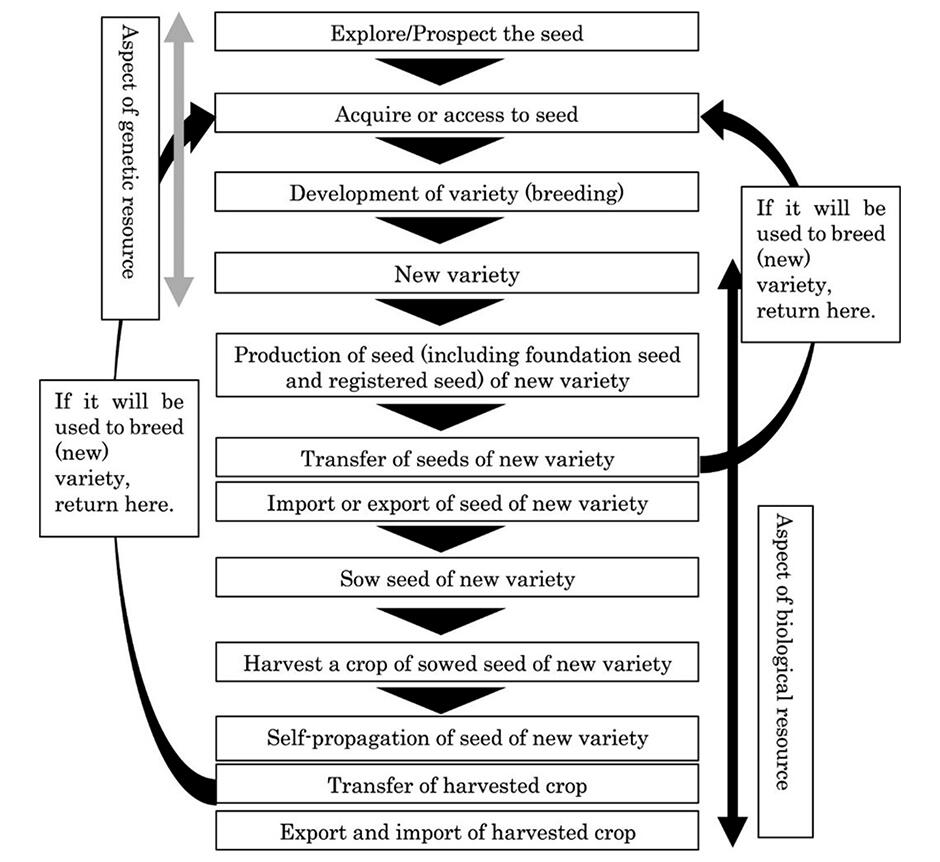To examine the possibility of "seed commons" that share seeds mainly at the prefectural level, the research group headed by Kunihiko Kobayashi of the RIHN and Professor Yoshiaki Nishikawa of Ryukoku University has investigated the present state of new variety development and sharing. They found that the acquisition and utilization of newly developed varieties, and seeds collected for cultivation by farmers in prefectures are not necessarily promoted in terms of resource access. The group clarified that this conflicts with the intentions of the national government, which has concluded an international convention to facilitate the acquisition of plant genetic resources.
Seeds of crops such as cereals, fruit trees, and flowering plants are indispensable not only for food production but also for the cultivation and development of new varieties. To protect and share seeds as biological and genetic resources, the international community has adopted the International Union for Protection of New Varieties of Plants (UPOV Convention) and the International Treaty on Plant Genetic Resources for Food and Agriculture (ITPGRFA), building a system of cooperation. The research group first analyzed the domestic implementation of ITPGRFA and the UPOV Convention to identify the policies and practices used by the state to abide by the conventions.
Next, the study examined databases of registered varieties to analyze the trends of local governments, conducted a questionnaire survey, clarified policies and practices of local governments, and explored the possibility of constructing "seed commons" to share domestic seeds. An analysis of the domestic implementation status of both conventions revealed that, after new varieties were developed, two aspects emerged in the process of transfer, harvest, and variety development: the treatment of seeds as genetic resources and that as biological resources. ITPGRFA establishes a multilateral system, (MLS), to facilitate the availability of seeds for critical crops and such. Parties are required to provide genetic resources stored in a gene bank and implement a Standard Material Transfer Agreement (SMTA) as a common agreement when providing them. In Japan, the National Agriculture and Food Research Organization (NARO) operates the gene bank.
The UPOV Convention aims at protecting new plant varieties, further developing varieties and promoting their use based on common basic rules. In essence, only the state signatory is required to "grant and protect cultivator rights," and not farmers and companies dealing in seeds and seedlings. The Japanese government has now signed the UPOV 1991 Convention, which was revised in 1991. Based on the revision of this convention, the Japanese Plant Variety Protection and Seed Act was also revised.
Under ITPGRFA, there is an MLS as seed commons. If the seeds provided are genetically improved and new varieties are developed, the 1991 UPOV Convention states that the rights of cultivators are not granted for the acts of acquiring seeds and developing new varieties in order to grow multiple varieties; therefore, it is consistent. Furthermore, by analyzing how varieties are developed by local governments and the actual state of seed distribution from data and questionnaire surveys spanning about 40 years, they found that there are local governments, such as Hokkaido and Nagano, that have developed more than 200 varieties over the past 40 years, considering the number of applications submitted for varieties registration by local governments based on the Plant Variety Protection and Seed Act. On the other hand, there are local governments, such as Shiga and Osaka, whose number of applications during the same period was 10 or fewer.
In a questionnaire survey on the distribution and restriction of cultivation varieties, more than 80% of the municipalities responding answered that varieties with cultivators' rights attached are "distributed only to producers and production centers in their jurisdictions." It became clear that 60% of local governments restricted the redistribution of seeds of the varieties distributed. Only 130 or 5% of the 2,814 new varieties of flowering flowers, garden plants, and crops developed by government agencies in prefectures over the last 40 years are in the possession of NARO. Of these, only two varieties can be distributed abroad through NARO under the SMTA.

Provided by RIHN
The results suggest that the realities of such local governments are in conflict with the state's ideas sympathetic with ITPGRFA, which has established mechanisms such as MLSs that facilitate accessibility to plant genetic resources. The research group states, "We would like to promote further research based on the results of this study to explore what conditions should be in place to form seed commons where stakeholders with different perspectives, such as companies, individual cultivators, public experimental and research institutes, universities, and farmers, can participate."
This article has been translated by JST with permission from The Science News Ltd.(https://sci-news.co.jp/). Unauthorized reproduction of the article and photographs is prohibited.




